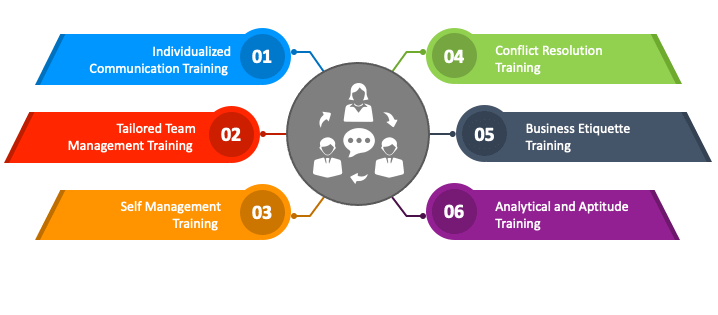In today’s rapidly changing work environment, companies recognize that technical skills alone are no longer enough to guarantee success. The ability to collaborate effectively, communicate clearly, and solve problems creatively is just as essential. Soft skills training has become a top priority for organizations seeking to enhance employee performance and foster a positive work culture. As we step into 2025, it’s crucial to understand the key soft skills employees need to thrive and how businesses can facilitate training programs to enhance these skills. In this blog, we’ll explore the most essential soft skills training topics for employees and why they are crucial for success in 2025.

Why Soft Skills Matter in 2025
In the fast-paced, tech-driven workplace of 2025, soft skills are the differentiating factor that separates great employees from good ones. Soft skills such as communication, emotional intelligence, and adaptability are crucial for navigating complex work environments and leading teams to success. According to a report by LinkedIn, 92% of talent professionals agree that soft skills are equally important, if not more important, than technical skills.
As we embrace new technologies and global collaboration, the following soft skills training topics will help employees remain relevant and competitive in the workforce.
1. Effective Communication
Communication is the cornerstone of all business operations. Employees must be able to express themselves clearly, listen actively, and adapt their communication styles depending on the audience. In 2025, with the rise of virtual teams and digital communication tools, effective communication has become even more critical.

Training Focus Areas:
- Verbal and non-verbal communication
- Active listening techniques
- Writing clear and concise emails
- Adapting communication for different mediums (video calls, chats, etc.)
2. Emotional Intelligence (EQ)
Emotional intelligence is the ability to understand and manage your emotions, as well as recognize and influence the emotions of others. EQ is especially vital in 2025, as workplaces increasingly value empathy, conflict resolution, and interpersonal skills. Employees with high EQ are better equipped to navigate complex interpersonal dynamics, handle stress, and build trust.

Training Focus Areas:
- Self-awareness and self-regulation
- Empathy and social awareness
- Managing stress and building resilience
- Conflict resolution techniques
3. Problem-Solving and Critical Thinking
Problem-solving is an essential skill that enables employees to address challenges with creativity and innovation. Critical thinking empowers them to analyze situations, weigh options, and make informed decisions. In the world of 2025, as technology continues to evolve, employees must be able to think critically to adapt and solve problems with efficiency and agility.

Training Focus Areas:
- Brainstorming and ideation techniques
- Decision-making processes
- Analytical thinking and evaluation
- Encouraging a growth mindset
4. Adaptability and Flexibility
The future of work is all about change—whether it’s a shift in technology, company structure, or market demands. Employees must be adaptable and open to new ideas, processes, and tools. Adaptability training helps employees stay agile and proactive in the face of uncertainty, making them better equipped to manage change in 2025.
Training Focus Areas:
- Embracing change and uncertainty
- Learning new technologies quickly
- Adapting to different work environments (remote, hybrid, or in-person)
- Building a mindset of continuous learning

5. Teamwork and Collaboration
Teamwork has always been crucial, but in 2025, it’s even more so. With remote work and global teams becoming the norm, fostering effective collaboration across diverse teams is a skill that employees must develop. Soft skills training for teamwork and collaboration helps employees work together seamlessly and leverage each other’s strengths to achieve shared goals.
Training Focus Areas:

- Building trust within teams
- Encouraging diversity of thought and perspective
- Leveraging team strengths and managing weaknesses
- Virtual teamwork strategies
6. Leadership Development
While leadership training has traditionally been reserved for managerial roles, soft skills training for leadership should be available to all employees. Developing leadership qualities such as decision-making, motivation, and the ability to inspire others will help employees excel in their careers, regardless of their title. Leadership in 2025 involves guiding teams through uncertainty and inspiring collaboration and creativity.
Training Focus Areas:
- Inspiring and motivating others
- Conflict management
- Leading teams through change
- Coaching and mentoring
Conclusion
In 2025, soft skills are no longer optional—they are essential. Whether employees are working remotely, in-person, or in hybrid environments, the ability to communicate effectively, collaborate, solve problems, and adapt to change will be key drivers of success. Investing in soft skills training will empower employees to thrive in a competitive, tech-driven marketplace and will help organizations build more resilient, engaged teams.
At Soft Skills Materials, we offer a wide range of resources to help businesses and organizations implement effective soft skills training programs. From training courses to workshops and assessments, we provide the tools needed to develop a workforce that’s ready for the challenges of tomorrow.
Call to Action: If you’re looking to boost your team’s soft skills in 2025, explore our resources at Soft Skills Materials and start building a stronger, more adaptable workforce today!
Soft skills are the backbone of success in the workplace. They transform knowledge into action and ensure that we not only perform but thrive together – Soft Skills Materials


